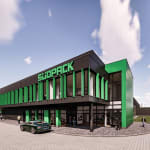
Südpack advocates the establishment of chemical recycling as a comple-mentary technology to mechanical recycling, which has not been suitable for processing the complex laminated films of the packaging industry. Collaboration with Recenso, a specialist in the implementation of systems for resource recovery, marks an initial pioneering step by the leading film manufacturer towards an efficient circular economy in the market.
Maximum product protection, which means maximum consumer protection, makes the use of laminated films essential. These films are composed of multiple layers of different polymers and ensure, among other things, a long shelf life and low packaging weight. Unfortunately, traditional mechan-ical recycling has its limitations in dealing with these materials. As a result, this valuable packaging cannot be made part of a closed loop.
The engineers of Recenso have developed a process that also makes it possible to convert mixed plastic fractions into a liquid and universally usa-ble hydrocarbon mixture, which can then be reused by the chemical indus-try as raw material for producing plastics of the highest quality. The innova-tive plants for direct oiling work according to the CARBOLIQ process and are unique in the world. An industrial-scale pilot plant was created at the waste management center in Ennigerloh. “The design complies with international standards for industrial applications and is used for the testing and further development of chemical recycling in Germany,” explained Christian Haupts, Managing Partner of Recenso GmbH in Remscheid.
The collaboration that was recently concluded between the two leaders in technology, Südpack and Recenso, now aims to convert production-related reusable materials into high-quality pyrolysis oil on an industrial scale. The produced pyrolysis oil will be supplied to the plastics industry as raw material for producing high-quality granules of virgin-grade quality. The goal is to use this material for producing product packaging in industries with high quality and hygiene standards, such as the food and medical product indus-tries.
Dirk Hardow, who is responsible for the collaborative project at Südpack, views the investment in the innovative project “as an initial pioneering step as a manufacturer of high-performance composite materials to making a significant contribution to a functioning circular economy in the plastic pack-aging industry. Chemical recycling makes it possible to meet the ambitious recycling rates of the EU strategy for plastics and of the German Packaging Act – and allows us to support our customers in meeting current and future market needs. Südpack is playing a pioneering role in the area and will fur-ther strengthen this innovation through investments in the future as well.”
Plastic products made from chemically recycled material can be recycled again after use. The more often chemical recycling is performed (with mate-rial that has already been chemically recycled), the more CO2 is saved that would have otherwise been produced in the refining of crude oil as a re-source and the incineration of the plastics after use. Last but not least, chemical recycling makes a particular contribution to closing loops and re-ducing greenhouse gases in the packaging industry.
Dirk Hardow is convinced that “the technology will also establish itself in the packaging industry.” Christian Haupts is extremely pleased about the com-mitment of his company’s new collaborative partner: “I am very proud to have Südpack as a partner that so strongly advocates the use of chemical recycling as a sensible, supplementary component for sustainable waste management and a sustainable, circular economy.”



